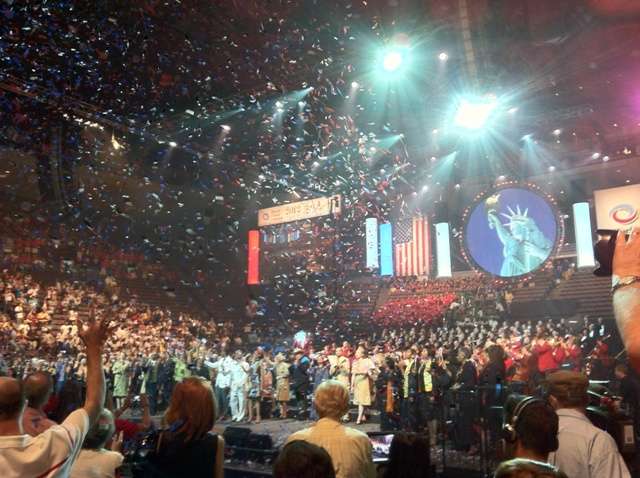|
Back
World Choir Games Help Celebrate America’s Birthday Cincinnati
U.S. Bank Arena
07/04/2012 -
Excerpts by T. Berens (Ode to This Land), A. Copland (The Tender Land), K. Franklin (I Can), G. and I. Gershwin (Porgy and Bess), J. Ward Howe (Battle Hymn of the Republic), Q. Jones (The Color Purple), B. Manilow (Let Freedom Ring), D. Ray/H. Prince (Boogie-Woogie Bugle Boy), Traditional (Back Up and Push), (I am a Man of Constant Sorrow), (Native African Drumming), (Shenandoah), (Yankee Doodle), M. Willson (The Music Man)
Jacqueline Echols (soprano), Steven Cole (tenor), Luther Lewis (tenor)
Cincinnati One in Song Choir, White Oak Singers, Comet Bluegrass All-Stars, CSO Classical Roots Community Choir, Boogie-Woogie Sisters (Stephanie Coffey, Ali Darley, Cristina Ferrari, Mary Wynn Haupt, Lauren Peter, Liz Wilson), Cincinnati Pops Orchestra, May Festival Chorus, John Morris Russell (Conductor)

The opening of the biennial World Choir Games (WCG) July 4 in Cincinnati, Ohio – the first time the “Olympics of choral music” has been held in the United States – coincided with the nation’s 236th birthday. This was fitting, but also flattering, for it brought 362 choirs from 48 countries to sing “happy birthday” to the U.S.
The Opening Ceremony was a splashy event, with a procession of choirs, presentation of flags and the singing of “The Star Spangled Banner” and World Choir Games Anthem before a crowd of 11,523 in U.S. Bank Arena, an indoor sports arena on the banks of the Ohio River. There were greetings from officials of Interkultur, sponsor of the World Choir Games, Cincinnati mayor Mark Mallory, U.S. Senator Rob Portman and Werner Geissler, Vice Chairman of Global Operations for Cincinnati-based Procter and Gamble, presenting sponsor of the WCG. A letter from President Obama was projected onto video screens overhead and read to the audience. The 2012 WCG Peace Bell, handsomely crafted by Cincinnati’s historic Verdin Bell Co., was rung seven times to herald the start of the games.
The concert itself began with gospel superstar Kirk Franklin and the Cincinnati One in Song composite choir in “I Can”, a catchy, inspirational song by Franklin, newly commissioned for the 2012 games. Cincinnati Pops conductor John Morris Russell took over for the remainder of the show, an ingeniously planned “getting to know you,” combined with a handsome Fourth of July celebration. Russell opened by acknowledging the prime mover of the event, late Cincinnati Pops conductor Erich Kunzel, who died of cancer in 2009. It was Kunzel’s fervent advocacy that persuaded Interkultur to stage its American debut in this lesser known Midwestern city (home, among other musical distinctions, to the Cincinnati May Festival, oldest continuing choral festival in the Western Hemisphere).
Arranged chronologically, the program provided a musical survey of American history. First up were the White Oak Singers of Mt. Orab, OH in an evocative demonstration of Native American drumming. Colonial and revolutionary times were represented by a spirited performance of “Yankee Doodle” by Russell and the Pops and a soulful “Shenandoah” with the 120-voice May Festival Chorus, both accompanied by projected images (fife and drum corps, pioneer scenes, etc.) The Comet Bluegrass All-Stars, a popular Cincinnati band, represented heartland Americana with the folk/traditional “I Am a Man of Constant Sorrow” and “Back Up and Push”, an energetic fiddle song, where they were joined by Russell and the Pops. Russell delighted the crowd here by stepping off the podium to join the band briefly on spoons. “The Battle Hymn of the Republic” with the Pops and the May Festival Chorus, provided a solemn recollection of the American Civil War.
Three guest artists from Cincinnati Opera’s contemporaneous production of Porgy and Bess carried the American perspective into the 20th century. Soprano Jacqueline Echols floated a sweet, high-lying “Summertime”, followed by tenor Steven Cole in a strutting, high-kicking “It Ain’t Necessarily So.” Later in the show, tenor Luther Lewis joined Echols and the Cincinnati Symphony Orchestra Classical Roots Spiritual Choir (50 voices) in “Maybe God is Trying to Tell You Something”, from the film The Color Purple. Arranged by Pops pianist Julie Spangler, it was one of the most energized numbers of the evening. Six khaki-clad members of the May Festival Chorus, aka the Boogie-Woogie Sisters, strode on for another highlight, “Boogie-Woogie Bugle Boy”, bringing the music into the World War II era. It was on to Broadway with “Seventy-Six Trombones” from Meredith Willson’s The Music Man where the crowd clapped along, and images of the Pops trombonists were projected onto the video screens (as were the trumpets in “Bugle Boy” and piccolos in the encore, ”Stars and Stripes Forever”.)
Echols, Lewis and the Classical Roots Choir cranked the excitement to an even higher level with Barry Manilow’s “Let Freedom Ring” and “Ode to This Land”, a collage of Tchaikovsky’s “1812 Overture”, Beethoven’s “Ode to Joy” and Woody Guthrie’s “This Land is Your Land” by Pops guitarist/arranger Timothy Berens, brought the entire company onstage for a flag-waving finale. The encore, “Stars and Stripes Forever” (another Kunzel nod), was capped by a red-white-and-blue confetti drop and three cannon shots.
Mary Ellyn Hutton
|